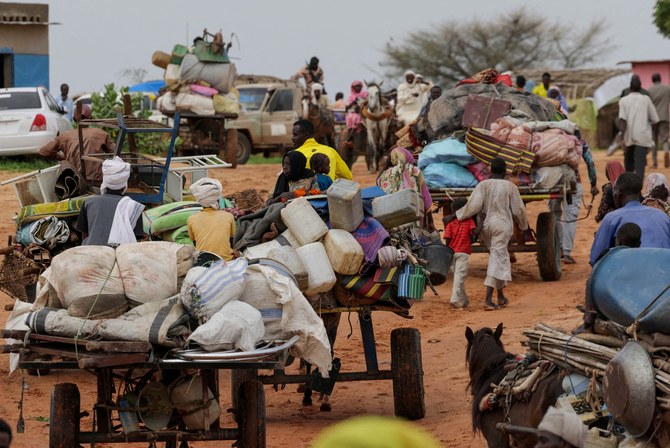Sudan’s Ongoing Crisis Spells Economic Trouble for Its Neighbors

Agencies – Sudan Events
TUNIS: Sudan, currently mired in a protracted war and economic turmoil, stands at the center of a multifaceted humanitarian crisis that ripples across its neighboring nations.
With Sudan’s economy in decline, the adjoining countries, deeply intertwined with its economic prospects, grapple with the fallout — disrupted trade and skyrocketing inflation. These challenges pose the risk of social upheaval and political instability that extends beyond Sudan’s borders, impacting millions throughout the region.
Armed groups operating in Sudan have also shown a propensity to seize opportunities presented by the chaos. They engage in criminal activities such as arms smuggling, human trafficking, and illicit trade, further destabilizing the region. The unrestricted flow of arms and fighters across borders poses a direct threat to the security of neighboring nations, creating challenges for humanitarian organizations striving to uphold the sacred “do no harm” principle.
Additionally, the aid sector grapples with a glaring gap between the pressing need for assistance and its actual delivery. According to the UN, a staggering 18 million people in Sudan require humanitarian aid, but only 3.5 million have received any assistance thus far. This stark disparity underscores the dire circumstances faced by millions of Sudanese citizens and raises critical questions about the effectiveness of humanitarian efforts in this complex environment.
The destruction of infrastructure in the most heavily affected regions, namely Khartoum, Darfur, and Kordofan, is estimated at $60 billion, equivalent to 10 percent of its total worth, according to Ibrahim El-Badawi, Sudan’s former finance minister and an economics researcher. He predicts a potential 20 percent drop in the gross domestic product for this year.
The former minister emphasizes that if the conflict were to cease, Sudan would require emergency economic support ranging from $5 billion to $10 billion to resuscitate the economy. He warns that the continuation of the war would lead to the further deterioration of the Sudanese economy and the state itself.
Experts highlight that beyond the physical insecurity plaguing the nation, the financial underpinnings of the aid sector are entangled in a web of challenges.
Grace Ndungu, a communications manager at Mercy Corps, a global nongovernmental humanitarian aid organization, underscores this point, stating: “Armed groups operating in the region often seize opportunities presented by Sudan’s chaos.”
These groups’ involvement in criminal activities, coupled with their ability to exploit international and regional financing meant for humanitarian assistance, further complicates the situation. At the same time, disputes over vital resources like water and arable land escalate tensions along the country’s borders.
She stresses that these challenges necessitate a conflict-sensitive human security approach to humanitarian response, rooted in cooperation with civic actors to mitigate risks. “Customized cash programming modalities can be a viable solution to navigate the intricacies of Sudan’s financial challenges,” Abdelmoniem said.
Experts say that in this tumultuous landscape of Sudan’s conflict and humanitarian crisis, proactive and sensitive approaches can mitigate risks and ensure that humanitarian assistance reaches those who need it most.



